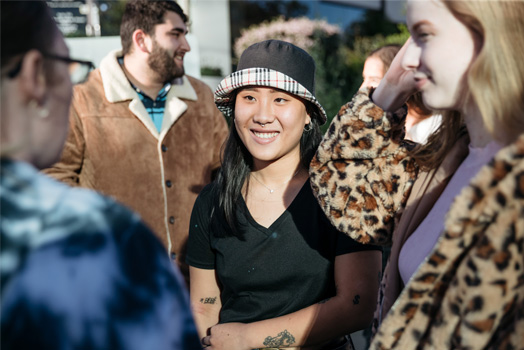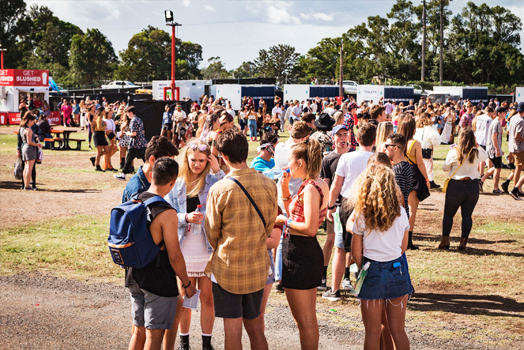It’s normal to want to hang out with your friends and have a good time. And you might be faced with new opportunities and decisions when partying, so we’ve put together some handy tips to help you have fun and stay safer.
Know and set your own limits
Before you head out, have a think about what you’re up for. This might include alcohol and other drugs or hook-ups. Chat with your friends so you’re all on the same page about what you want to do.
Knowing what you’re all into is a good way to help keep each other safe and make sure no-one's pressured into doing anything they’re not comfortable with.
Plan how you’ll get home after the party
It might sound like an obvious tip, but you don’t want to get stranded or end up in a car being driven by someone who is over the alcohol limit or has taken other drugs. There are heaps of options – you could use public transport, Uber, organise a lift, or have a designated driver.
Look after each other when you’re partying
Buddying up and looking after each other when you’re out partying is super important.
- stick together as much as possible
- help each other stay away from risky situations
- fully charge your phones and take a mobile charger with you. Sometimes if there are too many people on the network at festivals, your phone won’t work, so have a back-up plan:
- arrange a meeting point
- use live GPS tracking apps (like SearchParty)
- use walkie-talkies, coordinate outfits, or take brightly coloured props.
Alcohol and other drugs
Alcohol and other drugs can be fun, lift your mood and boost your confidence. In the longer term though, when the high wears off, the after-effects can leave you feeling worse than before and can impact on your mental health and wellbeing.
If you’re going to use alcohol and other drugs, there are things you can do to help keep you safer and not push your mind or body too hard.
Try setting a limit and keep tabs on how much you’re drinking. There are apps that can help with this, or you can use ‘notes’ in your phone. Try drinking water between alcoholic drinks, it can help you pace yourself and stay hydrated. And remember to eat! Alcohol on an empty stomach is a bad move.
Nobody should feel like it's their responsibility to prevent their drink being spiked. And it's never a person's fault if they do get spiked.
If you're worried about drink spiking, you can stay safer by always keeping an eye on your drink and not accepting any pre-opened drinks from others. If you’re unsure, buy yourself another or decline the drink. We know this can get pricey or awkward, but it’s better to be safe and know what you’re drinking.
There’s no ‘safe way’ to take illicit drugs [e.g., ecstasy (MD, MDMA)]. It’s hard to know the strength, what they might have been mixed with or how they will affect you.
If you do choose to use, safer options include:
- setting yourself a limit and sticking to it
- finding out as much as you can about the drug/s you’re going to take
- using pill testing if it’s available
- avoiding using alone – if anything goes wrong, it’s good to have others around to help
- telling your friends what you’re taking and how much. This makes it easier for them (and the ambulance officers/other supports) to know what to do if you need help
- not mixing your drugs (including alcohol and prescription meds). It can get messy, unpredictable and increase the risk of bad experiences and overdose
- trying a little bit first to see what the effects are. All drugs take different times to fully feel the effect
- spacing your drugs out if you’re going to take more.
If you’re injecting drugs, remember to use clean injecting equipment, avoid sharing needles (or other injecting equipment) and dispose of everything safely.
Safer substance use and harm minimisation
Harm minimisation is all about keeping you safe, no matter where you’re at with substance use. It’s not about judgement or pressure – it’s about understanding that people use substances for lots of reasons and making sure you have the information and support to look after yourself and others. Whether you’re thinking about using, already using, or supporting a friend who is, harm minimisation means things like;
- Knowing the risks
- Staying connected to people you feel safe with
- Looking after your mental and physical health, and;
- Getting help if you need it
Basically, it’s your body your choices- and you deserve respect, safety and support
For more information on specific substances check out this link: Drug Wheel - Alcohol and Drug Foundation https://adf.org.au/insights/drug-wheel/
You can also use Text the Effects which is an anonymous SMS service that provides confidential information about the effects of drugs. To use the service, simply text the name of the drug you want to know more about to 0439 835 563.
Before, During and After
The BDA framework stands for Before, During, and After - and it's a simple way to help you think about your substance use in a safer, more mindful way.
1. Before using check in with yourself... How are you feeling? Whats going on for you? Are you in a safe place with people you trust?
2. During use stay safe by being aware and making choices that keep you and others as comfy and safe as possible - like knowing your limits, staying hydrated, and looking out for your mates
3. After you have used notice how you are feeling- physically, mentally, and emotionally. Think about what helped, what didn't, and whether you'd do anything differently next time. It's not about being perfect - it's about being safe, informed, and looking after yourself.
Call 000 if anyone is passed out or in trouble and tell them as much as you can, this is so they can help - paramedics/ambos don't need to involve the police.
Sex, alcohol and other drugs, and consent
When we use alcohol or other drugs and are in a party environment, there can be more opportunities for hooking up, and our inhibitions can be lowered. Before heading out, it’s a good idea to think about what you’re OK with and not OK with doing. If you think it might happen, being prepped for sex is a great idea; take condoms/dental dams and lube.
Most importantly, before any sexual activity, it’s super important to always make sure you’ve given and received consent!
Sexual consent is about making sure you and your partner agree to have any type of sexual activity with each other. It helps make sure everyone has fun, is respected, and stays safe. Mixing sex with alcohol or other drugs can make consent complicated. Some things to think about:
- people’s judgement can be impaired if alcohol or other drugs are involved
- if a person is too high/drunk or incapable of giving their consent, then you don’t have consent
- if someone is passed out or asleep – you don’t have consent
- anyone can change their mind at any time or stop at any moment
- make sure no-one is forced or pressured into any kind of sexual contact.
Find more information about consent.
At festivals
It’s always a good idea to figure out the support places when you arrive.
This might include the medical tent, volunteers, the info tent and any designated safe spaces such as Dancewize. These places are there to support you to feel safe emotionally and physically, so make sure to head to them if you need some support/want a friendly face to talk to.
Recovering after all the fun
Whether you drank alcohol, took other drugs, or you had too much fun dancing or socialising, you might need some recovery time. The fastest way to recover is to look after yourself and get back into life. Do some fun stuff like catching up with your family and friends, getting active, eating well, getting some sleep, doing stuff you enjoy, and don’t forget to be kind to yourself.
Other useful resources
- Your Room – find out more about specific drugs and their effects
- Complete an interactive activity below:
For more information, to find your nearest headspace centre or for online and telephone support, visit eheadspace.
The headspace Clinical Reference Group oversee and approve clinical resources made available on this website.
Last reviewed December 2025
Get professional support
If you feel you need help there are a range of ways we can support you.


